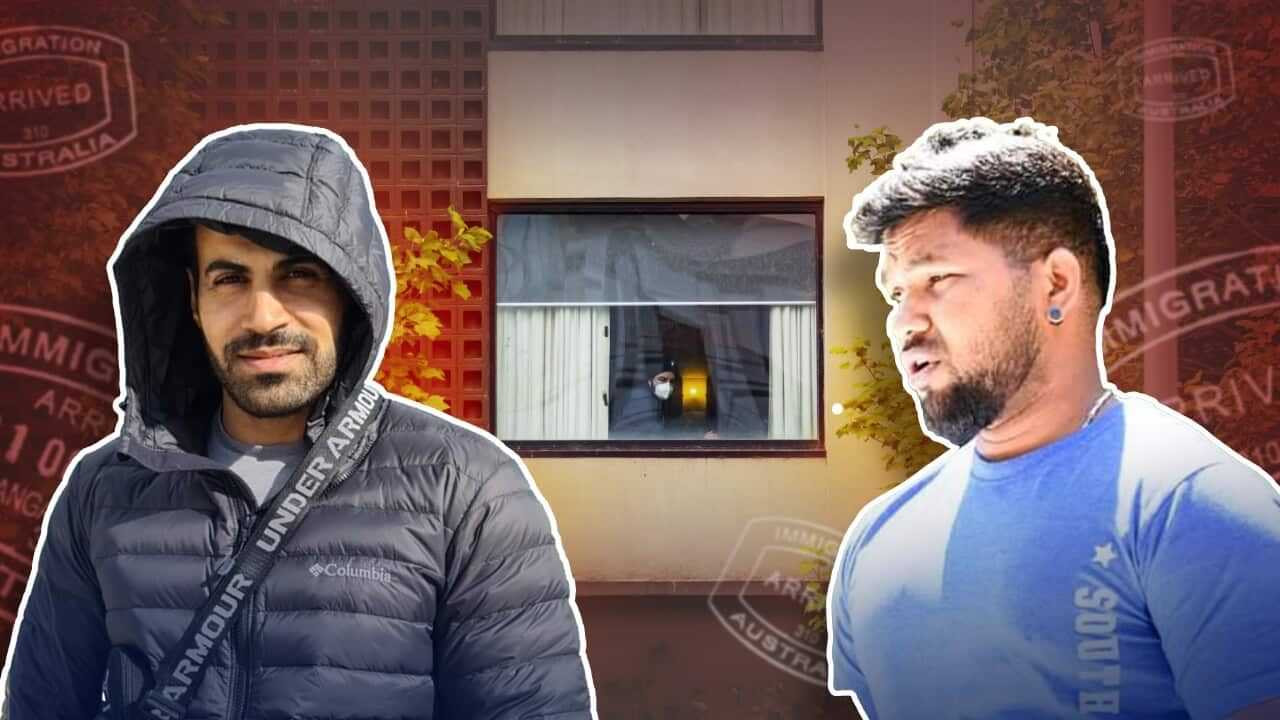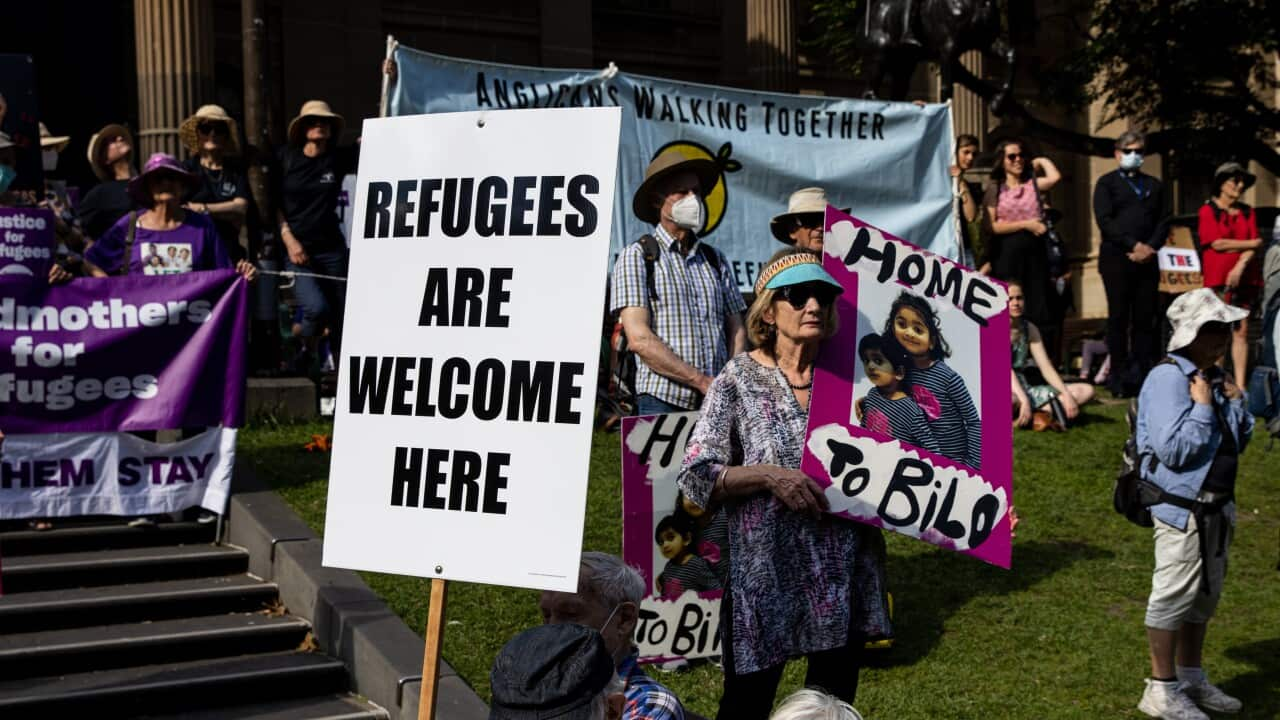Key Points
- Salah Mustafa and his son Mustafa Salah were two of the final eight released from Melbourne's park Hotel.
- Mr Mustafa says it is hard for him to find work as most employers prefer permanent visa holders.
It’s been just over two months since the , many have not been able to see their families and are still living in limbo.
In the lead-up to the 2022 federal election, there was a spate of releases from Australia’s immigration detention, including the final eight people being held in Melbourne’s Park Hotel.
Iraqi refugee Salah Mustafa and his son Mustafa Salah were two of the final eight released from the makeshift detention centre in Melbourne’s inner north on 7 April.
The two arrived in Nauru in 2013 and were moved to onshore detention in November 2021 under the now-repealed 'medevac' law.
After nine years in immigration detention, Mr Mustafa told SBS News his life on the outside is "very difficult".
"Everything has changed ... I lost ten years from my life, it's very difficult," he said.
'End the limbo'
When Mr Mustafa and his son arrived in Nauru in 2013 his son was 14 years old.
“Nine years in a detention centre with my son, and my son (was) 14, is now 24, without the school, without anything.”
Now on a bridging visa, Mr Mustafa said it is hard for him to find work as most employers prefer permanent visa holders.
His son is also struggling to find work without the required certificates and can not study due to the conditions of his visa.
“[My son] is in a bodybuilding club and is a coach training all the time when he was in Nauru and the detention centre. Many people say they’ll give him the job, but he can't work because he doesn't have a certificate.
"He can’t, the visa doesn't allow him to go to school, make a certificate or make something,” Mr Mustafa said.
A spokesperson for the Asylum Seeker Resource Centre told SBS News: “People need certainty and urgent resettlement options to put an end to the limbo.”
“After nine years, refugees are still separated from their family, have to re-apply for visas after six months and are unable to rebuild their lives with any certainty. Resettlement options must be urgently prioritised,” they said.
'We do not feel safe'
Iranian refugee Hossein Latifi was released from Melbourne’s Park Hotel on 1 April after nine years in immigration detention.
“On a bridging visa for six months you do not feel safe. Everybody feels this way," he told SBS News.
“Because [if you do] anything [wrong], they will take you back inside the detention. Nobody wants to see that situation anymore. So that's why we are very careful about the places we want to go.
"I know some people who sometimes, they prefer to stay inside the accommodation of the house because they say, we do not feel safe because you are on bridging visa."

Iranian refugee Hossein Latifi after being released from Melbourne’s Park Hotel on the 1st of April 2022. Source: Supplied
He has since become a human rights activist for people seeking asylum and is an intern with the Asylum Seeker Resource Centre (ASRC).
“There are many people like me in this community living with suffering. Still, we have been in limbo,” he told SBS News.

Sri Lankan refugee Thanush Selvarasa. Source: Supplied
“The immigration, they said we cannot apply ourselves until we get the letter from the minister, the minister wanted to say this person can apply for this visa, then once we receive that letter then we can apply for the visa again for six months.
“Next month my visa is going to finish but we'll see what will happen to us,” he said.
What comes next?
Mr Mustafa said his main priority now is to be resettled in Canada or New Zealand so he and his son can be reunited with his wife and the other son who remains in Iraq.
"I want my family, after nine years I want to settle down with my family, it’s very important.”
"I don't care if I go to Canada and New Zealand, that I don't care, what's important is that I settle down with my family."
"If I stay in Australia for this visa, I'll never see my wife and another son forever."
A spokesperson for the ASRC said there are currently no prospects of refugees who arrived by boat after 2013 settling in Australia.
“The future of refugees [currently on bridging visas] is different depending on whether people are on a resettlement pathway to the US, Canada, NZ or another third country.”
“Once all these places have been exhausted, about 575 refugees do not currently have a resettlement pathway as this was not prioritised by the Morrison government,” the spokesperson said.
Hope for change with new government
Mr Latifi said he hopes the new Labor government will take urgent action to get people out of PNG and Nauru and to provide permanent protection visas to those currently on bridging visas.
“How can I be happy when my friends are stuck in Nauru and PNG? I don't care about your nationality, your skin, we are all human," he said.
“First, get people out from PNG and Nauru to a safe place, and then we get permanent visas … fix the system and just make the process a bit faster."
According to the ASRC, there are currently 104 people being detained in PNG and 112 on Nauru. Six people transferred from PNG and Nauru to Australia for medical treatment remain in detention in Brisbane and Melbourne.
In an election promise, the Labor government has committed to providing permanent residency to thousands of refugees living on Temporary Protection Visas (TPVs) and Safe Haven Enterprise Visas (SHEVs).
A spokesperson from the Department of Home Affairs told SBS News in a statement, “the Australian government is considering options to give effect to election commitments regarding TPV and SHEVs.”
“Currently, unlawful arrivals are only eligible for temporary protection if they are found to engage Australia’s protection obligations, that is, either a TPVs or a SHEVs.”
The Melbourne Park Hotel is currently still being used as an Alternative Place of Detention (APOD) for the purposes of immigration detention, including for detainees undertaking COVID-19 quarantine or temporary placement prior to removal.


